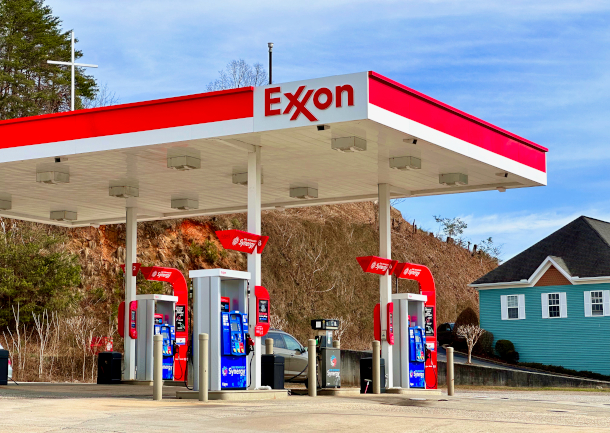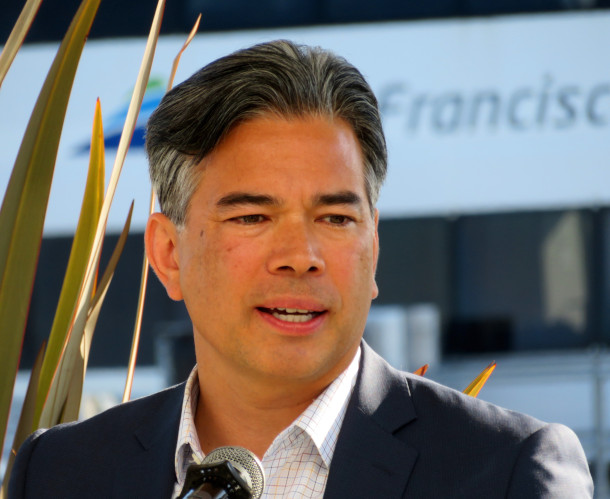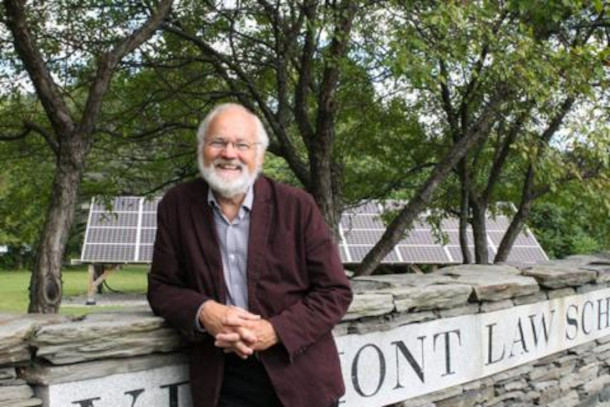Exxon's Alleged Plastics 'Deception'
Air Date: Week of September 27, 2024

Although Exxon is known for selling gas and oil, they also manufacture plastic. (Photo: Harrison Keely, Wikimedia Commons, CC BY 4.0)
California is suing ExxonMobil over the oil giant’s alleged “campaign of deception” to convince the public that recycling is a viable solution for plastic waste, when less than 10% of plastics are recycled. Pat Parenteau, emeritus professor at Vermont Law and Graduate School, joins Host Aynsley O’Neill to discuss the lawsuit and the plastic waste crisis.
Transcript
DOERING: From PRX and the Jennifer and Ted Stanley Studios at the University of Massachusetts, Boston, this is Living on Earth. I’m Jenni Doering.
O’NEILL: And I’m Aynsley O’Neill.
Despite the takeoff of curbside recycling over fifty years ago, these days less than 10% of the world’s plastic waste actually ends up getting recycled. The rest ends up in landfills, or as pollution in the natural environment, or in our own bodies in the form of microplastics. In response to this plastics crisis, California is suing oil giant ExxonMobil in state court, alleging that Exxon deceived the public about the ability to recycle plastic that was made from its fossil fuels. Of particular issue is Exxon’s promotion of so-called “advanced” or chemical recycling, which claims to be able to turn hard-to-recycle plastics into new products but has not lived up to those promises. Joining us now to talk about the lawsuit is Pat Parenteau, former EPA regional counsel and emeritus professor at Vermont Law and Graduate School. Welcome back to Living on Earth, Pat!
PARENTEAU: Thanks, Aynsley, nice to be with you.
O'NEILL: So, Pat, what are the key takeaways from this California lawsuit against ExxonMobil?
PARENTEAU: So, this is a landmark case, because it's the first time a state attorney general has actually sued an oil company, of course, ExxonMobil, in this case, for plastic pollution. So there have been lawsuits brought against companies that sell products in plastic containers like Pepsi and Keurig coffee cups. So, we know that there have been lawsuits challenging the way that companies have characterized their recycling, but this is the first time any state has actually gone after the oil company itself.
O'NEILL: And what exactly is California asking the courts to do here?
PARENTEAU: They're asking a lot. Their main claim is that ExxonMobil is creating a public nuisance. This may sound familiar because it's also one of the claims in the climate liability cases that we've talked about over time, but they've also alleged unfair business practices, false advertising, violations of water quality. Because, of course, the plastics ends up in the water. They end up in the ocean. They end up in human beings with microplastics. So, they've got a long list of claims and requests for injunctions prohibiting the company from making false claims that they've alleged in the complaint and creating an abatement fund to deal with the plastic pollution along the California coast and elsewhere. So, lots of things contained in this lawsuit.
O'NEILL: Now, Exxon claims that it's able to take plastic waste and turn it into new products via so called advanced or chemical recycling. Pat, why doesn't California buy that argument?

ExxonMobil faces a lawsuit from California Attorney General Rob Bonta regarding their claims about plastic recycling. (Photo: Pi.1415926535, Wikimedia Commons, CC BY-SA 3.0)
PARENTEAU: So, the lawsuit alleges that less than 10% of the advanced recycling is actually recycled. And so, if Exxon wants to say, “we are experimenting with ways to reuse these plastic products,” that would be perfectly all right, but they can't make the claim that they found this breakthrough that means we aren't going to have plastic waste anymore. That's the problem.
O'NEILL: And now this lawsuit is just in California, but I do know that California can also often set a standard for the rest of the United States to sort of follow after the fact. What do you think this could have as a national impact, if California wins in this?
PARENTEAU: I think some of the usual, as we like to say, the usual suspects, meaning New York, Massachusetts, Connecticut, Minnesota, these are progressive, blue, if you will, states with attorneys general that are very aggressive in enforcing environmental law, bringing climate lawsuits. So, I think we're going to see a ripple effect of these other major states that have already sued oil companies for their deception regarding climate change and the fact that they're not really reducing emissions the way they say they are. They're going to make those same kind of claims with respect to plastic pollution and the lack of really effective efforts at recycling. So, the same kind of states that have led the charge on climate, I think we can begin to see them doing the same thing on plastics.

Pat Parenteau is a professor at Vermont Law and Graduate School. (Photo: Vermont Law and Graduate School)
O'NEILL: There's a chance that this could go all the way to the Supreme Court. How do you think that the case would fare there at the Supreme Court, especially given the conservative lien that the court has right now?
PARENTEAU: Yeah, I mean, one of the claims that ExxonMobil is going to make is that this is an infringement on their First Amendment rights. The Supreme Court has said that corporations, just like you and I, have first amendment rights to commercial speech and political speech. So, I've already seen out of the Exxon spokespersons a signal that they are going to press very hard that what the state is really doing here is trying to tell them how to do business and what they can say about their products and infringing on their First Amendment rights to advocate for recycling if they think it really can work. So that's the kind of issue that might attract the attention of the Supreme Court with its ultra conservative majority. On the other hand, there are a number of justices on the court who've upheld state laws. Even some of the most conservative justices, like Gorsuch and Thomas, are very strong states’ rights sort of leaning justices, and so it may be, if the case actually does get all the way to the Supreme Court that the court will have a harder time overruling the states attempting to enforce state laws dealing with consumer protection, dealing with false advertising and so forth. It would be a major precedent setting case if the Supreme Court decides that the First Amendment is really implicated in these cases.
O'NEILL: So often this plastics problem is presented as a sort of consumer choice issue. You know, people just need to make the better choice. They need to choose glass packaging, or they need to be extra diligent about recycling, and all of those are great steps, but it's not able to solve the full problem on its own. So how might this lawsuit help reframe the plastics issue, do you think?

Parenteau believes that the case against ExxonMobil could have impacts in other states around the country. (Photo: Vermont Law and Graduate School)
PARENTEAU: Well, let's hope that if it's successful, the effort to find substitutes that not only don't rely on plastics, but remember, the source of all this is fossil fuel. It's oil, and it's the oil companies realizing that at least at some point they'll be out of the business of providing fuel for electricity and transportation, but they're going to have to find other uses of oil in other products, namely, plastics. So, the real challenge here is it's a systemic problem. It's the way that we live. It's not a matter of lowering quality of life. It's a matter of living differently and demanding substitutes for products that we know are causing environmental harm, and hopefully there'll be entrepreneurs who see the opportunity to develop those kinds of substitutes and different packaging, different products, and a true closed cycle system where we don't have waste at all. That's a long way down the road, I'm afraid, but it's the kind of thinking that's necessary to get us out of this. We've got to find new ways of thinking about the way we live, the way we use resources, and being much more efficient in trying to get to this closed loop system where you just don't have all this waste.
O'NEILL: Pat Parenteau is a former EPA Regional Council and emeritus professor at Vermont Law and Graduate School. Pat, as always, thank you for taking the time with us today.
PARENTEAU: It's always good to be with you.
O’NEILL: An ExxonMobil spokesperson provided a statement in response to the lawsuit that reads in part: “For decades, California officials have known their recycling system isn't effective. They failed to act, and now they seek to blame others. Instead of suing us, they could have worked with us to fix the problem and keep plastic out of landfills.” The full statement is on the Living on Earth website, loe dot org.
ExxonMobil Spokesperson Statement:
“For decades, California officials have known their recycling system isn’t effective. They failed to act, and now they seek to blame others. Instead of suing us, they could have worked with us to fix the problem and keep plastic out of landfills. The first step would be to acknowledge what their counterparts across the U.S. know: advanced recycling works. To date, we’ve processed more than 60 million pounds of plastic waste into usable raw materials, keeping it out of landfills. We’re bringing real solutions, recycling plastic waste that couldn’t be recycled by traditional methods.”
Links
Learn more about Pat Parenteau
Read Inside Climate News’ article about the lawsuit against ExxonMobil
Living on Earth wants to hear from you!
Living on Earth
62 Calef Highway, Suite 212
Lee, NH 03861
Telephone: 617-287-4121
E-mail: comments@loe.org
Newsletter [Click here]
Donate to Living on Earth!
Living on Earth is an independent media program and relies entirely on contributions from listeners and institutions supporting public service. Please donate now to preserve an independent environmental voice.
NewsletterLiving on Earth offers a weekly delivery of the show's rundown to your mailbox. Sign up for our newsletter today!
 Sailors For The Sea: Be the change you want to sea.
Sailors For The Sea: Be the change you want to sea.
 The Grantham Foundation for the Protection of the Environment: Committed to protecting and improving the health of the global environment.
The Grantham Foundation for the Protection of the Environment: Committed to protecting and improving the health of the global environment.
 Contribute to Living on Earth and receive, as our gift to you, an archival print of one of Mark Seth Lender's extraordinary wildlife photographs. Follow the link to see Mark's current collection of photographs.
Contribute to Living on Earth and receive, as our gift to you, an archival print of one of Mark Seth Lender's extraordinary wildlife photographs. Follow the link to see Mark's current collection of photographs.
 Buy a signed copy of Mark Seth Lender's book Smeagull the Seagull & support Living on Earth
Buy a signed copy of Mark Seth Lender's book Smeagull the Seagull & support Living on Earth

